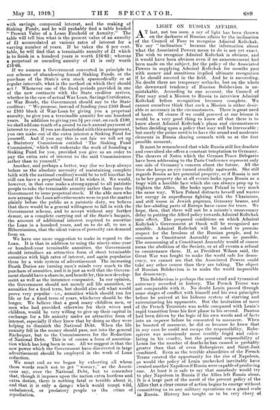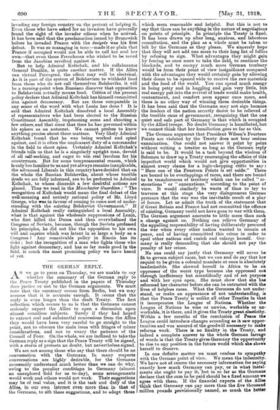LIGHT ON RUSSIAN AFFAIRS.
AT last, not too soon, a ray of light has been thrown on the darkness of Russian affairs by the inclination of the Council of Four to recognize Admiral Koltchak. We say " inclination " because the information about what the Associated Powers mean to do is not yet exact. The wish to recognize Admiral Koltchak is obvious, and it would have been obvious even if no announcement had been made on the subject, for the policy of the Associated Powers in supplying Admiral Koltchak for months past with money and munitions implied ultimate recognition if he should succeed in the field. And he is succeeding. No doubt there are temporary setbacks, but on the whole the downward tendency of Russian Bolshevism is un- mistakable. According to one account, the Council of Four may send a Mission to Russia to interview Admiral Koltchak before recognition becomes complete. Wo cannot ourselves think that such a Mission is either desir- able or necessary in the circumstances. There is great need of haste. Of course if we could proceed at our leisure it would be a very good thing to know all that there is to know about Admiral Koltchak's plans and circumstances before deciding upon a policy that may well be irrevocable ; but surely the prime need is to have the sound and moderate elements in Russia sharing counsels with us at the first possible moment.
It must be remembered that while Russia still lies desolate and convulsed she offers a constant temptation to Germany. The sheaves of Notes which the German Peace Delegates have been addressing to the Paris Conference represent only one side of Germany's concern about the future. All the time she keeps an eye turned steadily eastwards. She still regards Russia as her potential property, or if Russia is not to be her property she at all events looks upon Russia as a bogy with a horrible face which she can always prop up to frighten the Allies. She looks upon Poland in very much the same way. When Poland distracts herself and wastes her energy in superfluous fighting with the Ukrainians, and still worse in Jewish pogroms, Germany beams, and the law-abiding parts of Europe have cause for tears. We hope, then, that there will not be a minute's unnecessary delay in putting the Allied policy towards Admiral Koltchak into effect. The proposed conditions on which Admiral Koltchak's Government at Omsk will be recognized are sensible. Admiral Koltchak will be asked to promise respect for the freedom of the Russian people, and to summon a Constituent Assembly as soon as possible. The summoning of a Constituent Assembly would of course mean the abolition of the Soviets, or at all events a refusal to countenance them. If, as President Wilson said, the Great War was fought to make the world safe for demo- cracy, we cannot see that the Associated Powers could take any other course than they are taking. The object of Russian Bolshevism is to make the world impossible for democracy.
This Bolshevism is perhaps the most cruel and tyrannical autocracy recorded in history. The French Terror was not comparable with it. No doubt Lenin passed through some stages of conflict with himself and his own principles before he arrived at his hideous system of starving sod exterminating his opponents. But the hesitation of most of the French Terrorists was noble compared with Lenin's rapid transition from his first phase to his second. Denton had been driven by the logic of his own words and of facts into an impasse before he consented to massacre. When be boasted of massacre, he did so because he knew that in any case he could not escape the responsibility. Robe- spierre was notoriously more terribly frigid and calcu- lating in his cruelty, but the personal responsibility of Lenin for the number of deaths he has caused is probably greater than that of even Robespierre and Saint-Just combined. Even as the terrible absurdities of the French Terror created the opportunity for the rise of Napoleon, so would the policy of Lenin unchecked inevitably have created another Napoleon if Russia were capable of producing one. At least it is safe to say that somebody would try to play Napoleon in Russia if the Allies left Russia alone. It is a large part of the merit of the present policy of the Allies that a clear course of action begins to emerge without committing us to any military operations on.a grand scale in Russia. History has taught us to be very chary of Invading any foreign country on the pretext of helping it. Even those Who have asked for an invasion have generally found the sight of the invader odious when he arrived. It has been said that the proclamation issued by Brunswick before he invaded France with the bnigree was his first defeat. It was so managing in tone—made it so plain that France if occupied would not be able to call her soul her own—that even those Frenchmen who wished to be saved from the Jacobins revolted against it. But to help Admiral Koltchak, and his collaborator General Denikin, is quite another matter. If the Allies can victual Petrograd, the effect may well be electrical. As it is part of the system of Bolshevism to withhold food from those who do not call themselves Bolsheviks, it will be a turning-point when Russians discover that opposition to Bolshevism actually means food. Critics of the present policy declare that Admiral Koltchak has himself committed sins against democracy. But are these comparable in any sense of the word with what Lenin has done ? It is said that Admiral Koltchak dissolved a local Assembly of representatives who had been elected to the Russian Constituent Assembly, imprisoning some and shooting a few others, and that since that time he has governed within his sphere as an autocrat. We cannot profess to know anything.precise about these matters. Very likely Admiral Koltchak found that he was being worked and spied against, and it is often the unpleasant duty of a commander in the field to shoot spies. Certainly Admiral Koltchak's friends tells us that he is a eingelarly upright man, devoid of all self-seeking, and eager to win real freedom for his sountrymen. But for some temperamental reason, which is only too familiar to us and yet always remains inexplicable, the advanced Liberals in this country have decided that on the whole the Russian Bolsheviks, about whose terrible deeds we are fully informed, are to be preferred to Admiral Koltchak. to whose discredit a few doubtful actions are placed. Thus we read in the Manchester Guardian : " The recognition of Koltchak would mean the final defeat of the well-meaning and entirely rational policy of Mr. Lloyd George, who was in favour of coming to some sort of under- standing with the existing Bolshevist Government." If Admiral Koltchak really extinguished a local Assembly, what is that against the wholesale suppressions of Lenin, who first killed the Hums and then overwhelmed the Congress of Soviets, because, though the Soviets professed his principles, he did not like the opposition to his own will and caprice which was latent in so large a body as a Congress ? Any conceivable policy in Russia has its risks ; but the recognition of a man who fights those who fight against democracy, and has so far made good in the field, is much the most promising policy we have heard of yet.



































 Previous page
Previous page